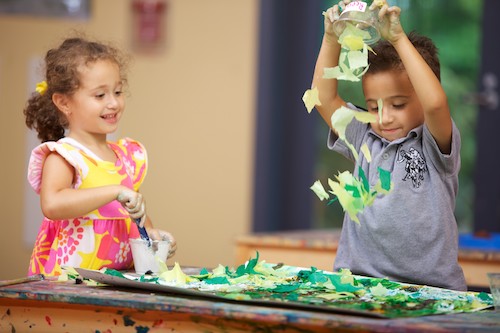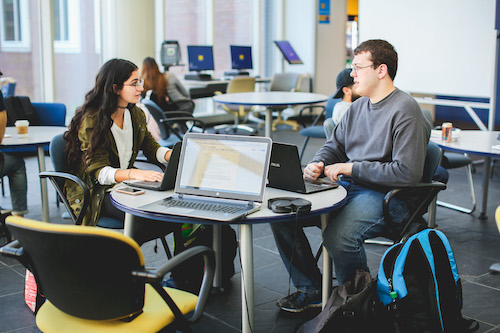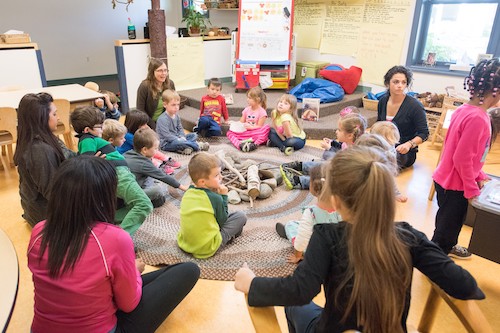PBL in Education
B.A. in Children and Families

Students have the opportunity to engage in PBL in the Children and Families program through a series of practicum and internship experiences that place them in early childhood and preschool settings.
For more information: Children and Families
Practicum Experiences
In their practicum classes students spend 45 hours in an assigned preschool setting where they can observe the different pedagogical strategies being taught in their coursework put into action in an authentic setting. They are also given the chance to engage with young learners and practice implementing some of those strategies on their own.
Internships
Students take one of two internship classes depending on their chosen concentration. In both internships they spend an entire semester participating in supervised teaching in an early childhood setting. Through mentorship from their cooperating teacher and university supervisor they are able to practice and refine their teaching skills while working with young students.
B.A. in Instructional Design and Learning Technologies

In the Instructional Design and Learning Technologies program students practice PBL by working on projects that utilize technology to address the challenges of learning and engaging in internship experiences that place them in a variety of settings. PBL can be found specifically in the following courses.
For more information: Instructional Design and Learning Technologies
EDT 420 - Online Learning Design & Development
Students identify a population of learners and area of content and develop a series of online learning modules and materials for that specific population.
EDT 462 - Internship in Instructional Design and Learning Technologies
Students are placed in a semester-long internship where they work on an identified instructional technology project in order to apply and develop their skills and knowledge in this area.
Teacher Certification

In the Teacher Certification program students progress through a sequence of increasingly independent professional experiences. In the early part of their program students take three class that place them in educational settings with K-12 students so they can start to observe the methods and best practices they are learning about in their coursework. During the apprenticeship phase of the program students pair specific methods courses with apprenticeship classes that consist of a semester-long placement in two different grade levels. These placements allow students to implement different teaching techniques and strategies in K-12 classrooms. The program culminates with a semester-long student teaching internship where students are paired with a cooperating teacher and university supervisor, both of whom mentor and guide them as they become the lead teacher in a K-12 classroom.
For more information: Elementary Teacher Certification and Secondary Teacher (grades 6-12) Certification
EDA 200 - Social Justice & Community Based Education
Through community engagement students will learn to build relationships and identify the social, cultural and ecological assets that exist in communities. Drawing on this understanding of community students will learn how to structure educational experiences that culturally sustaining and promote students’ critical academic agency.
EDA 306 - Foundations of Professionalism
Exploring formal education in social context, this course will introduce students to the field of education, providing working knowledge of key elements of teacher professionalism, of professional preparation and improvement, of learners' developmental traits, and of basic planning, assessment, and instruction in classroom settings. The class further introduces the structure, organization, and financing of schools and systems, with consideration to the role of education in a democratic society and to sometimes-contested and political aspects of schools and instruction. The course also serves to familiarize students with essential aspects of the University of Michigan-Dearborn's educator preparation program, launching use of its M-Portfolio system, demonstrating effective mentoring and collaborative improvement, and initiating observation and participation in field-based learning settings.
EDC 240 - Psych of Child Development
Students will be able to use practical application of present knowledge of using facts and theories that concern the development of the child from birth through adolescence. From there students will be able to experience field observations and have direct interactions with children.
ESL Methods & Apprenticeship I
Through place-based learning preservice teachers apply ESL methods through two 7-week clinical experiences in different grade levels in a local school.
Methods (General of Subject) & Apprenticeship II
Through place-based learning, preservice teachers apply cross-curricular or content-specific methods through two 7-week clinical experiences in different grade levels in a local school.
Through practice-based learning students apply pedagogical content knowledge through a semester-long internship in a local school.
Classes with Community Connections
EDA 200* - Social Justice & Community Based Education
Through community engagement students will learn to build relationships and identify the social, cultural and ecological assets that exist in communities. Drawing on this understanding of community students will learn how to structure educational experiences that culturally sustaining and promote students’ critical academic agency.
EDA 306* - Foundations of Professionalism in Education
Exploring formal education in social context, this course will introduce students to the field of education, providing working knowledge of key elements of teacher professionalism, of professional preparation and improvement, of learners' developmental traits, and of basic planning, assessment, and instruction in classroom settings. The class further introduces the structure, organization, and financing of schools and systems, with consideration to the role of education in a democratic society and to sometimes-contested and political aspects of schools and instruction. The course also serves to familiarize students with essential aspects of the University of Michigan-Dearborn's educator preparation program, launching use of its M-Portfolio system, demonstrating effective mentoring and collaborative improvement, and initiating observation and participation in field-based learning settings.
EDA 371* - Reading Models and Methods
Through place-based learning, students in this methods course supplement existing curriculum materials with culturally relevant texts in the endeavor of facilitating culturally sustaining pedagogies. Through this process, the students engage learners in on-going literature-based instruction activities that center around their cultural, linguistic, and imaginative capital. The students video record and reflect on the enactment of one lesson.
EDD 446 - Intervention Strategies EC Spec Ed
In teams students work with a teacher to identify supports and/or materials needed for children with disabilities in their classroom. Upon identification of the supports needed, teams create materials that reflect the needs of the children. During the creation of materials students create a video presentation of the materials created (a) describing the materials created, (b) describing the “how” the materials support the engagement of young children with disabilities in the classroom setting, and (c ) ideas for how the teacher may use the materials with their students. Finally, students individually write a short reflection of the process, their experience, and working alongside team members.
EDD 449* - Teaching English as Second Language
Students create their own Sheltered Instruction Observation Protocol (SIOP) lesson plan to learn more about designing learning experiences that more adequately meet the needs of students who speak English as a second language. These SIOP lessons are also presented to their classmates for reflection and feedback.
EXPS 298 - Exploring Writing to Communicate, Learn, & Teach
Through place-based learning, students reflect upon their implementation of an after-school writing clinic at River Oaks Elementary in Dearborn Public Schools where they support third through fifth-grade students' writing development in informational/explanatory writing.
Contact Information
CEHHS Office for Student Success
262 (2nd Floor) Fairlane Center South (FCS)
19000 Hubbard Drive Dearborn, MI 48126
cehhs-oss@umich.edu
313-593-5090
